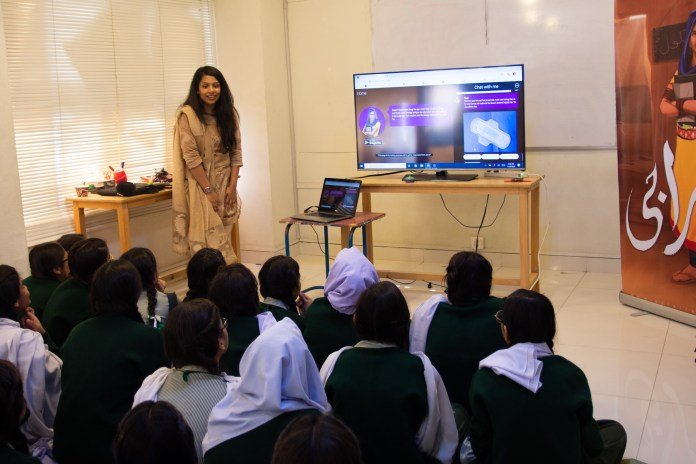One of the taboo topics in Pakistan is ‘Menstruation’ with several myths and stories spun around it. Anything remotely related to periods is shunned and looked down upon. The natural process created by God is considered shameful and disgusting, specially in the rural and semi urban areas.
More than 50% of Pakistani women belonging to the age group of 10 to 35 years have zero knowledge and information about the process of menstruation, which is why they are shocked and, ashamed and unable to talk to anyone about it when it first happens to them.

Period poverty is a global issue, that impacts almost 1/3rd of these 50% women in Pakistan and millions of women worldwide. These women stop going to schools when periods happen and miss workdays. The situation is worse in rural areas where women are treated like untouchables during the five to seven-day period. According to a survey conducted by UNICEF in 2017, there were 60 to 80% of girls involved in unhygienic menstrual practices.
Saba Khalid, the CEO of Aurat Raaj, has come up with one great idea to tackle and bust menstruation myths and convey correct information about periods to younger women and girls, through a chatbot named Raaji. Raaji is an animated chatbot, that uses artificial intelligence to educate school going girls about menstruation via pre-programmed content. It also tries to answer questions and clearly as possible without anyone operating it.

As Pioneer Post reports Saba saying, “There’s a lot of shaming that happens, girls at that age don’t understand [periods] and they kind of associate promiscuity to starting your period, they associate ‘fast living’ or whatever, all sorts of things at that age. They really do associate that because they don’t understand that it’s a normal biological process.”

Saba Khalid created this chatbot at The Nest I/O, the local start-up incubator. Raaji is basically a mobile application that answers questions about several female related health issues, that women may hesitate in asking anyone close to them.
Most women don’t have access to hospitals or doctors and if they do, they shy away from asking about menstruation from even lady doctors- we are talking about either very young girls or females residing in suburban areas of Pakistan. Even in a city like Karachi, there are low income areas where period poverty and lack of awareness exists. For questions that are complex and cannot be answered by the chatbot, they are working on connecting the app to gynaecologists and obstetricians who can answer these questions in real time.
The main problem, however, is accessibility. Because girls who are living in period poverty and need this chatbot the most often do not have access to mobile phones and high- tech applications.
“The girls I want the application to download, they also don’t have access to the phone, or, if they do, they share it,” says Saba.
The problem with the application reaching its core target audience is one of the main challenges. To tackle this issue, Aurat Raaj conducts menstrual myth workshops in partnership with schools as well as firms selling female hygiene products. Schools like the Garage School in Neelum Colony was targeted.
The workshop starts with building trust amongst students with the app and moves on to more complex and serious questions in presence of an expert. Then finally, the students talk privately with the bot and can ask any question that they maybe shy in asking in front of other students and teachers.
To address this issue in Pakistan, similar programmes should be tremendously expanded along with highlighting the affordability issue regarding sanitary pads in a country like Pakistan where almost 40% of the population is living below the poverty scale.
